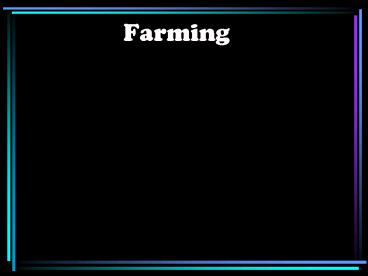Farming - PowerPoint PPT Presentation
1 / 18
Title:
Farming
Description:
We study farming in Geography for two main reasons firstly ... Milking equipment encourage milk workforce profit combine harvesters regular machines surpluses ... – PowerPoint PPT presentation
Number of Views:40
Avg rating:3.0/5.0
Title: Farming
1
Farming
2
- Farming or agriculture is the growing of crops
and rearing of animals. We study farming in
Geography for two main reasons firstly we need
farms to provide us with most of the food which
we eat, and secondly farmland takes up a large
amount of the land surface in Britain.
3
In this unit you will learn
- The three main types of farming in the UK
- The factors that influence the type of farming
practised - The inputs, processes and outputs in a farming
system - The main changes that have occurred in farming
over the last 50 years
4
Farm Types
- Match the farming type to the appropriate
meaning and copy them all into your jotter. - Arable Farms - a combination of arable and
- pastoral, although
one or the - other may
dominate. - Pastoral Farms - farms growing crops e.g.
- barley, wheat or
potatoes. - Mixed Farms - farms that rear
grass-eating animals
e.g. sheep and cattle.
5
- Farmers need to make a decision about what type
of farm is best suited to their land. The
decisions on what to farm are based on a
combination of factors which can be classified as
either physical or human factors.
Physical Factors
Handout 1
Read through your handout and then fill in the
blanks using the words in the box below
Minimum arable temperatures pastoral
thin 250mm machinery marshy
500mm rainfall fertile sunshine
6
Human Factors
Handout 2
- Read through handout 2 and fill in the blanks
using the words in the box below
Milking equipment encourage milk
workforce profit combine harvesters
regular machines surpluses
7
Farming in the UK Handout 3
- We have looked at the physical and human factors
that influence where each type of farming takes
place. Now we will look at the geographical
pattern of farming types in the UK
8
Arable Farming
- Located in areas where there is deep, fertile
soil and the land is quite flat. A relatively
dry climate, reliable rain in the growing season,
warm summers and frost in the winter to break up
the soil are also necessary. - Locations E SE England, E Scotland
9
Hill Sheep Farming
- Located in areas where the land is unsuitable for
growing crops due to the climate, the steepness
of the slope or the poor soil quality. - Sheep are hardier animals and can cope with
colder, wetter and windier conditions. - Locations Mountainous areas in the North and
West of Scotland
10
Cattle Farming
- Dairy Farming
- Located in areas with flat land, fertile
well-drained soils, high-quality grass, mild
winters and reliable rainfall. - Dairy farms also need to be located close to
urban markets. - Locations Western parts of England, Scotland
and Wales
11
Cattle Farming
- Beef Cattle Farming
- Located in areas with high, steep land, thin
infertile soils, high rainfall and low
temperatures. - Locations Upland areas in England, Wales and
Scotland
12
Market Gardening
- Read section 12F page 92 of The Human
Environment. - Fill in the Market Gardening box on your handout
in a similar way to the three we have just
completed together.
13
Two British Farms
Which of the two farms is likely to be a sheep
farm? Give reasons for your answer.
14
The Farming System
- Take a new page in your jotter. Put A Farm
System as your title and copy the sentence
below - Farming works as a system with inputs,
processes and outputs.
15
Human/Economic Inputs
Physical Inputs
Processes
COPY THIS INTO A WHOLE JOTTER PAGE
Arable Farm
Pastoral Farm
Outputs
Outputs
16
Put the words in the box below into the correct
part of the farming system flowchart you have
just drawn.
milking wool planting soil
relief dipping meat barley
land machinery selling seeds
fodder crops climate potatoes
fruit feeding fertilisers animals
milk spraying buildings
planting beans shearing transport
labour peas harvesting calving
chemicals ploughing medicines
weeding
17
Land-Use Patterns on a Farm
- Read section 12J page 93 of The Human
Environment - Task 1 Sketch in your jotter a diagram similar
to Figure 12.5 - Task 2 Annotate your diagram
18
(No Transcript)































